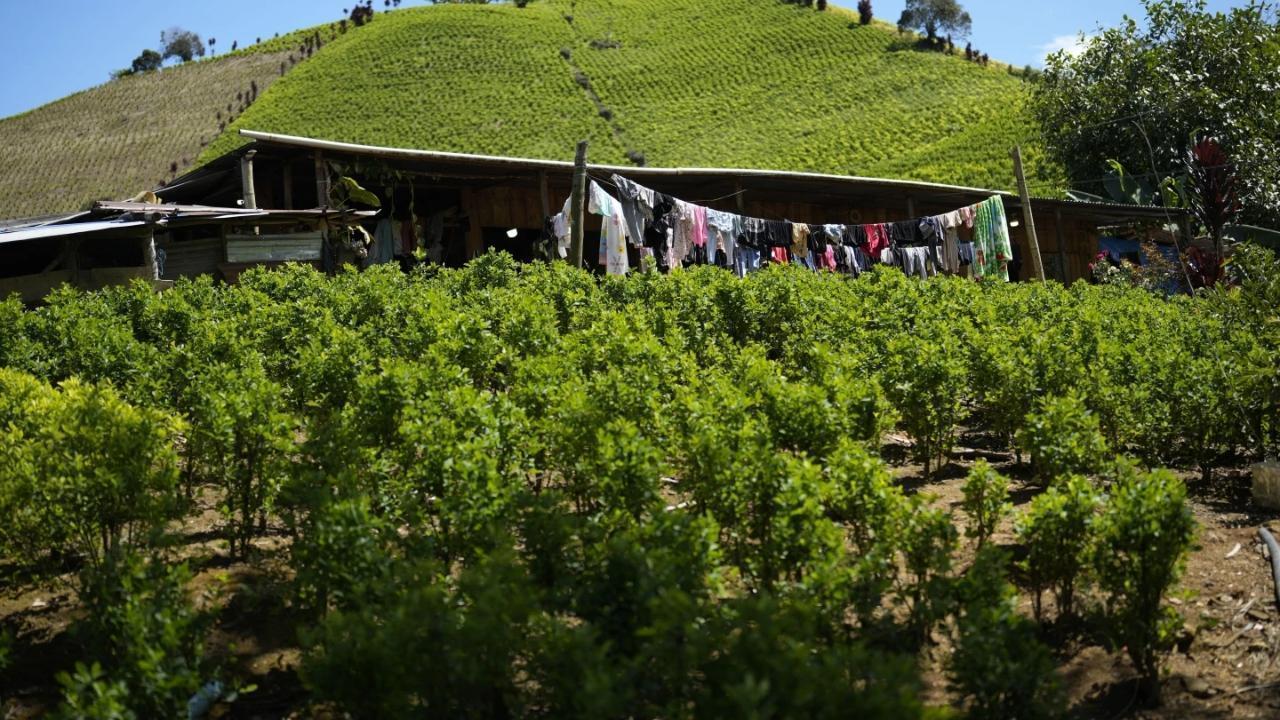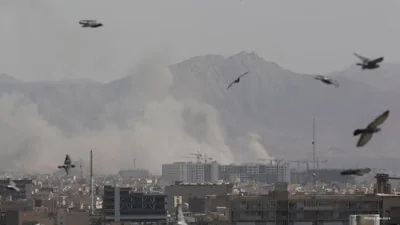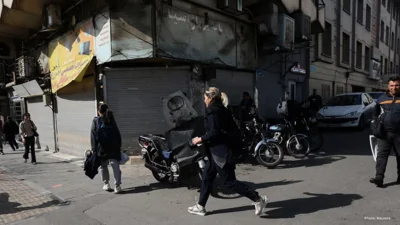
Post by : Monika
Photo: AP
For the first time in nearly three decades, the United States has formally stated that Colombia is not doing enough to combat the production and trafficking of illegal drugs. This announcement has caused concern in both countries and has sparked debates about international relations, national sovereignty, and the global fight against drugs.
The decision by the U.S. government comes amid a record increase in coca cultivation—the plant used to make cocaine—and growing tensions between the U.S. and Colombian President Gustavo Petro.
Background: Colombia and the Drug Trade
Colombia has long been a key partner in the global fight against illegal drugs. The country has been producing coca, the main ingredient in cocaine, for decades. In the past, the United States has provided significant support to help Colombia reduce coca cultivation. This assistance has included funding for eradication programs, law enforcement support, and aerial spraying of chemicals like glyphosate to destroy coca plants.
These efforts were part of the larger “War on Drugs” strategy, which aimed to reduce the global supply of cocaine. For years, the collaboration between Colombia and the United States helped decrease coca production, although the problem was never fully eliminated. The situation has always been complex because it involves not only drug production but also issues of poverty, politics, and conflict with armed groups that rely on the drug trade.
Increase in Coca Cultivation
Recently, reports indicate that coca cultivation in Colombia has reached 253,000 hectares, the highest in the country's history. This dramatic increase has alarmed U.S. authorities because it suggests that Colombia may not be prioritizing the fight against drug trafficking as strongly as before.
Several factors have contributed to this growth. The Colombian government has reduced aerial spraying of coca plants, citing health and environmental concerns. Additionally, economic challenges and ongoing internal conflicts make it difficult for the government to fully enforce anti-drug measures.
The United States views these developments with concern because the increase in coca plants leads to more cocaine being exported worldwide. This situation affects public health, safety, and law enforcement efforts in countries around the globe, including the U.S.
The U.S. Decision
The United States has a review process to assess how well other countries are cooperating in the fight against drugs. When a country is found lacking, the U.S. can label it as “not fully cooperating” in counternarcotics efforts. This designation is serious because it can influence aid, international relations, and public perception.
In Colombia's case, the U.S. has officially stated that the country is not meeting expectations in the fight against drugs. This is the first time Colombia has received this classification in nearly 30 years. While the U.S. has not imposed sanctions that would cut off aid, the designation sends a strong message that American authorities expect more action from Colombia.
President Petro’s Response
President Gustavo Petro has responded to the U.S. criticism by defending Colombia’s actions and priorities. He argues that Colombia has been making significant efforts to combat drug trafficking while also balancing other national concerns.
One major point of contention is the use of glyphosate, a chemical used in aerial spraying to destroy coca plants. In the past, this method was widely used with U.S. support. However, President Petro has halted its use, claiming it is harmful to the environment and dangerous for human health. This decision reflects a shift in Colombia’s approach to drug eradication, emphasizing sustainability and public safety over aggressive chemical spraying.
Another issue is the extradition of certain individuals to the United States. President Petro has refused to send some rebel leaders involved in drug trafficking to the U.S., citing ongoing peace negotiations and the importance of maintaining domestic stability. He argues that extradition in these cases could undermine the peace process and create more conflict within Colombia.
Challenges Facing Colombia
Colombia faces a number of challenges that make fighting the drug trade difficult. Poverty and lack of economic opportunities drive many farmers to cultivate coca because it is more profitable than traditional crops. Armed groups and criminal organizations rely on the coca trade to fund their operations, making enforcement risky and complex.
Furthermore, Colombia is addressing other national priorities, such as climate change, education, and energy development. President Petro’s administration has emphasized these areas as part of a broader vision for Colombia’s future. Balancing these priorities with the need to combat drug trafficking creates tensions in policy and implementation.
International Reactions
The U.S. criticism of Colombia has drawn attention from international observers, policymakers, and human rights organizations. Some see the U.S. position as a necessary step to maintain accountability in the global fight against drugs. Others view it as an intrusion into Colombia’s sovereignty and domestic policy choices.
Experts note that this situation highlights the complexity of international drug policy. Countries may have different priorities and methods, and what works for one government may not be acceptable or feasible for another. The debate also raises questions about the influence of powerful nations on smaller or less economically powerful countries.
What This Means for the Future
While Colombia has not been sanctioned, the U.S. designation puts pressure on the government to take further action. Authorities in Colombia may need to increase law enforcement efforts, improve monitoring of coca cultivation, and strengthen cooperation with U.S. counternarcotics agencies.
The designation also affects public perception. Internationally, it signals that Colombia’s efforts are under scrutiny. Domestically, it may create political pressure on President Petro to adjust policies or face criticism from opposition parties and the public.
Broader Implications
The U.S.-Colombia situation is part of a larger discussion about global drug policy and cooperation. Many countries produce, transit, or consume illegal drugs, making the problem international in nature. Effective solutions require collaboration, resource-sharing, and mutual understanding between nations.
At the same time, the case raises important issues about national sovereignty. Colombia’s government is making decisions based on what it believes is best for its citizens and environment. The U.S., as a partner and major aid provider, has expectations that may not fully align with Colombia’s domestic priorities. Navigating this tension is a key challenge for both countries.
Potential Outcomes
Importance of Collaboration
Experts emphasize that the fight against illegal drugs cannot be solved by one country alone. Coca cultivation, trafficking networks, and drug consumption are global problems requiring cooperation across borders. The situation between the U.S. and Colombia underscores the need for dialogue, shared goals, and respect for each country’s circumstances.
President Petro has also highlighted the importance of social and economic reforms in addressing drug-related problems. He argues that sustainable alternatives for farmers and community support are critical in reducing coca production. This approach suggests a long-term strategy that combines law enforcement with social and economic development.
The U.S. decision to criticize Colombia’s efforts in the drug war marks a significant moment in international relations. While Colombia has made some progress in addressing drug trafficking, the recent increase in coca cultivation has led to serious concerns from the U.S. government. President Petro defends Colombia’s actions, emphasizing environmental protection, national sovereignty, and social reform.
This situation illustrates the complexity of global drug control. Cooperation, accountability, and understanding between nations are essential. The U.S.-Colombia relationship will likely continue to face challenges as both countries navigate their shared goal of reducing the harmful effects of illegal drugs while respecting national priorities.
Moving forward, it is crucial for both countries to engage in constructive dialogue, develop effective policies, and maintain collaboration. The world will be watching to see how Colombia and the U.S. balance enforcement, diplomacy, and social responsibility in the fight against drugs.










Mattel Revives Masters of the Universe Action Figures Ahead of Film Launch
Mattel is reintroducing Masters of the Universe figures in line with its upcoming film, tapping into

China Executes 11 Members of Criminal Clan Linked to Myanmar Scam
China has executed 11 criminals associated with the Ming family, known for major scams and human tra

US Issues Alarm to Iran as Military Forces Deploy in Gulf Region
With a significant military presence in the Gulf, Trump urges Iran to negotiate a nuclear deal or fa

Copper Prices Reach Unprecedented Highs Amid Geopolitical Turmoil
Copper prices soar to all-time highs as geopolitical tensions and a weakening dollar boost investor

New Zealand Secures First Win Against India, Triumph by 50 Runs
New Zealand won the 4th T20I against India by 50 runs in Vizag. Despite Dube's impressive 65, India